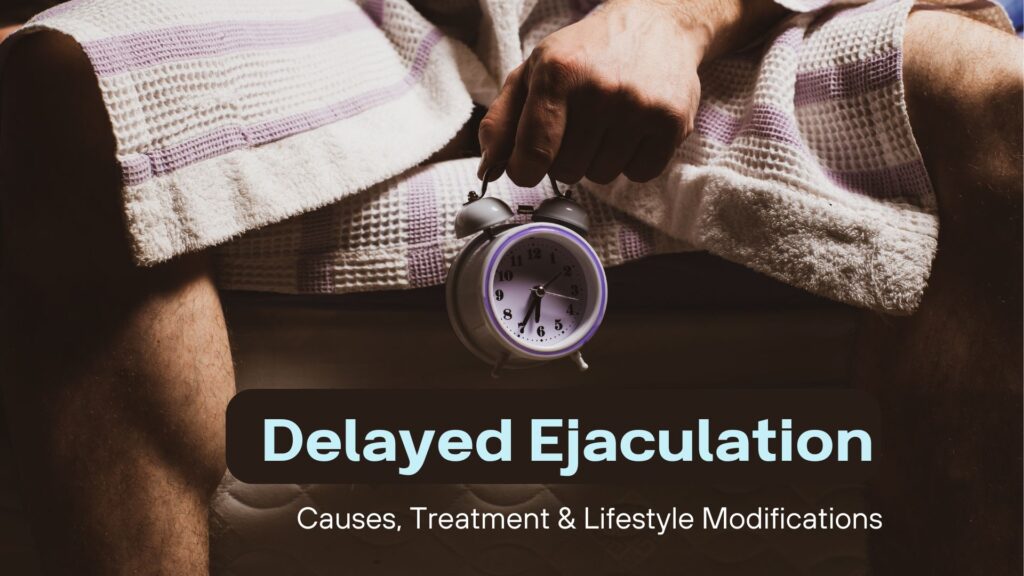Delayed ejaculation is a sexual dysfunction that affects a significant number of men worldwide. It’s a condition where a man experiences a prolonged time, or inability to reach orgasm and ejaculate during sexual activity, despite sufficient stimulation. Unlike premature ejaculation, where ejaculation occurs too quickly, delayed ejaculation involves a prolonged period of sexual activity without reaching a climax. This condition can lead to frustration, stress, and dissatisfaction for both the individual and their partner. In this article, we provide a comprehensive understanding of delayed ejaculation, covering its causes, symptoms, diagnosis, treatment options, coping strategies, and its impact on relationships.
Delayed ejaculation occurs when the typical ejaculatory response is delayed or absent, even though sexual arousal and desire are present. This delay in ejaculation can vary in duration, ranging from minutes to hours or even being unable to ejaculate at all. It’s important to note that delayed ejaculation does not necessarily indicate a lack of sexual desire or arousal.
Also Read: How does erection occur?
Causes and contributing factors
Delayed ejaculation can have various underlying causes, including both psychological and physical factors. Psychological factors may include performance anxiety, relationship issues, stress, or a history of sexual trauma. On the other hand, physical factors such as certain medications, hormonal imbalances, nerve damage, or medical conditions like diabetes or multiple sclerosis can also contribute to delayed ejaculation.
Delayed Ejaculation is different from Erectile Dysfunction, as it involves difficulty reaching orgasm and ejaculating despite prolonged sexual activity, whereas Erectile Dysfunction refers to difficulties achieving or maintaining an erection.
Also Read: Premature Ejaculation – Causes, Treatment & Exercises
Diagnosing Delayed Ejaculation
Diagnosing delayed ejaculation involves a comprehensive assessment by a urologist. This process typically includes a thorough medical history to understand the onset, duration, and potential contributing factors of the condition. A physical examination may be necessary to evaluate for any physical abnormalities or underlying health conditions. Psychological assessment is also crucial to explore any psychological factors or emotional issues influencing sexual function.
Diagnostic criteria outlined in the Diagnostic and Statistical Manual of Mental Disorders (DSM-5), are used to confirm the diagnosis. Laboratory tests may be needed to assess for underlying medical conditions or hormonal imbalances. For example, blood tests may be needed to measure hormone levels, such as testosterone, which plays a crucial role in sexual function. Additionally, blood tests may be conducted to screen for other medical conditions that could contribute to delayed ejaculation, such as diabetes or thyroid disorders.
Additionally, a psychological evaluation by a qualified mental health professional may be conducted if psychological factors are suspected. Partner involvement in the diagnostic process can provide valuable insights into relationship dynamics and sexual satisfaction.
Treating Delayed Ejaculation
Treating delayed ejaculation typically involves a multifaceted approach that may include behavioral techniques, medications, lifestyle changes, and psychological interventions. The choice of treatment depends on the underlying cause of the condition, as well as individual preferences and circumstances
Certain medications may be prescribed to address underlying medical conditions or factors contributing to delayed ejaculation. For example, medications to treat erectile dysfunction, such as phosphodiesterase type 5 (PDE5) inhibitors like sildenafil (Viagra) or tadalafil (Cialis), may help improve erectile function and ejaculatory control. Additionally, medications that affect serotonin levels, such as selective serotonin reuptake inhibitors (SSRIs) or tricyclic antidepressants, may be used off-label to manage delayed ejaculation.
In cases where hormonal imbalances are identified as contributing to delayed ejaculation, hormone replacement therapy (HRT) may be recommended. This involves supplementing deficient hormones, such as testosterone, to restore hormonal balance and improve sexual function.
Also Read: Erectile Dysfunction – Causes, Treatment & Lifestyle Modifications
Counseling or psychotherapy may be beneficial for individuals with delayed ejaculation, especially if psychological factors are contributing to the condition. Cognitive-behavioural therapy (CBT), sex therapy, or couples therapy can help address underlying issues such as performance anxiety, relationship conflicts, or negative sexual beliefs, and improve sexual communication and intimacy.
Significance of Lifestyle Modification
Lifestyle modifications can indeed have a profound impact on managing delayed ejaculation by addressing underlying factors that may contribute to the condition. Adopting a healthy diet rich in fruits, vegetables, lean proteins, and whole grains can support overall physical health, including cardiovascular function, which is essential for optimal sexual performance. Certain nutrients like zinc, found in foods such as oysters, nuts, and seeds, may also play a role in testosterone production, which can influence sexual function. Additionally, staying hydrated by drinking plenty of water is important for maintaining proper bodily functions, including sexual health.
Regular exercise is another crucial aspect of lifestyle modification for managing delayed ejaculation. Engaging in a good mix of aerobic exercises like jogging, swimming, or cycling and anaerobic forms such as weight training, can improve blood flow, boost cardiovascular health, and enhance overall stamina and endurance. Strength training exercises, such as weightlifting or resistance training, may also help build muscle mass and improve physical fitness. By promoting overall well-being and reducing stress levels, regular exercise can contribute to better sexual function and ejaculatory control.
Managing stress is paramount for individuals experiencing delayed ejaculation, as stress can negatively impact sexual desire, arousal, and performance. Techniques such as mindfulness meditation, deep breathing exercises, progressive muscle relaxation, or yoga can help alleviate stress and promote relaxation. Additionally, incorporating stress-reducing activities into daily life, such as spending time in nature, practising hobbies, or socializing with loved ones, can further support emotional well-being and enhance sexual satisfaction. Furthermore, ensuring adequate sleep is essential, as sleep deprivation can disrupt hormone levels, mood, and energy levels, all of which can affect sexual function. Establishing a consistent sleep schedule, creating a comfortable sleep environment, and practising good sleep hygiene habits can help improve sleep quality and overall health, there by positively impacting sexual function and ejaculation control.
How can we help?
At SOLVEMyHealth, we understand the sensitive nature of sexual health concerns, including delayed ejaculation, and we’re here to provide comprehensive support and solutions tailored to your needs. Our platform offers a range of services designed to address both the physical and psychological aspects of delayed ejaculation, ensuring holistic care and support for our clients.
With a team of experienced urologists specializing in sexual health, SOLVEMyHealth offers confidential and convenient online consultations to discuss your concerns, provide personalized assessments, and develop individualized treatment plans. Our urologists can offer expert guidance and medical interventions, including prescribing medications to address underlying factors contributing to delayed ejaculation. We understand the importance of privacy and discretion, and our secure platform ensures that your personal information remains protected at all times.
In addition to medical interventions, SOLVEMyHealth provides access to a multidisciplinary team of experts, including psychologists, dietitians, and exercise specialists, who can offer support and guidance in making lifestyle adjustments to improve not only sexual health but overall well-being. Our psychologists can help address any psychological factors contributing to delayed ejaculation, offering counselling and therapy to enhance sexual confidence and intimacy. Our diet and exercise experts can provide personalized recommendations to optimize nutrition, promote physical fitness, and manage stress, all of which can positively impact sexual function.
SOLVEMyHealth serves as a unique platform that integrates curative care, including access to medical professionals and prescribed medications, with preventive care, such as lifestyle modifications and behavioural interventions. By bringing together these complementary approaches, we empower individuals to take control of their sexual health and enhance their overall quality of life. Whether you’re seeking treatment for delayed ejaculation or looking to improve your sexual and overall well-being, SOLVEMyHealth is here to support you every step of the way, with compassion, expertise, and confidentiality.











3 comments
[…] Also Read: Delayed Ejaculation – Causes & Treatment […]
[…] Also Read: Delayed Ejaculation – Causes & Treatment […]
[…] Also Read: Delayed Ejaculation – Causes & Treatment […]